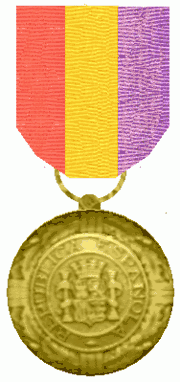Spanish Republican government in exile
The Government of the Spanish Republic in exile (Spanish: Gobierno de la República Española en el exilio) was a continuation in exile of the government of the Second Spanish Republic following the victory of Francisco Franco's forces in the Spanish Civil War. It existed until the restoration of parliamentary democracy in 1977.
Government of the Spanish Republic in exile Gobierno de la República Española en el exilio | |||||||||
|---|---|---|---|---|---|---|---|---|---|
| 1939–1977 | |||||||||
| Status | Government in exile | ||||||||
| Capital | Madrid Capital in exile: Paris (1939-1940/1946-1977) Mexico City (1940-1946) | ||||||||
| Common languages | Spanish | ||||||||
| Government | Multi-party Republic | ||||||||
| President | |||||||||
• 1939–1940 (first) | Diego Martínez Barrio | ||||||||
• 1970–1977 (last) | José Maldonado Gonzalez | ||||||||
| Prime Minister | |||||||||
• 1939–1945 (first) | Juan Negrín | ||||||||
• 1971–1977 (last) | Fernando Valera Aparicio | ||||||||
| Historical era | Interwar period / Cold War | ||||||||
• Established | 4 April 1939 | ||||||||
• Disestablished | 1 July 1977 | ||||||||
| |||||||||
History
Following the fall of the Republic in April 1939, the President (Manuel Azaña) and Prime Minister (Juan Negrín) went into exile in France. Azaña resigned his post and died in November 1940. He was succeeded as President by Diego Martínez Barrio, who had been Prime Minister in 1936. Following the Occupation of France, the government was reconstituted in Mexico, which under the left-wing President Lázaro Cárdenas continued to recognise the Republic, although Negrín spent the war years in London. Negrín resigned as Prime Minister in 1945 and was succeeded by José Giral.
Until 1945, the exiled Republicans had high hopes that at the end of World War II in Europe, Franco's regime would be removed from power by the victorious Allies and that they would be able to return to Spain. When these hopes were disappointed, the government-in-exile faded away to a purely symbolic role. The government moved back to Paris in 1946. There was also a Basque government in exile and a Catalan government in exile.
In the immediate postwar period it had diplomatic relations with Mexico, Panama, Guatemala, Venezuela, Poland, Czechoslovakia, Hungary, Yugoslavia, Romania, and Albania.[1] But the United States, the United Kingdom, France and the Soviet Union did not recognise it.[2]
Following Franco's death in 1975, King Juan Carlos initiated a democratic transition. In 1977 the exiled Republicans accepted the re-establishment of the monarchy and recognised Juan Carlos' government as the legitimate government of Spain. The key moment came when Socialist leaders Felipe González and Javier Solana met Juan Carlos at Zarzuela Palace in Madrid — a tacit endorsement of the monarchy by the previously staunchly republican Socialists.
On 1 July 1977, the Government of the Spanish Republic was formally dissolved. In a gesture of reconciliation, Juan Carlos received the exile leaders at a ceremony in Madrid.
Presidents in exile
| # | Portrait | Coat of arms | Name | President From | President Until | Political Party |
|---|---|---|---|---|---|---|
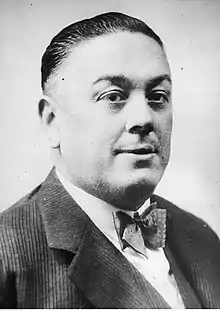 |
-Flag_Variant.svg.png.webp) |
Diego Martínez Barrio Interim |
March 3, 1939 | May 11, 1940 | Republican Union | |
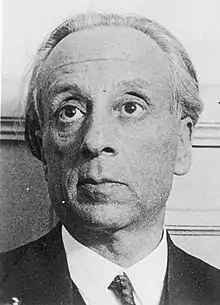 |
-Flag_Variant.svg.png.webp) |
Álvaro de Albornoz y Liminiana Interim |
May 11, 1940 | August 17, 1945 | Independent | |
| 1 |  |
-Flag_Variant.svg.png.webp) |
Diego Martínez Barrio | August 17, 1945 | January 1, 1962 | Republican Union |
| 2 |  |
-Flag_Variant.svg.png.webp) |
Luis Jiménez de Asúa | January 1, 1962 | November 16, 1970 | Spanish Socialist Workers' Party |
| 3 |  |
-Flag_Variant.svg.png.webp) |
José Maldonado Gonzalez | November 16, 1970 | July 1, 1977 | Republican Left |
Prime Ministers in exile
| Portrait | Name (Birth–Death) |
Term of office | Political Party | President (Term) | |||
|---|---|---|---|---|---|---|---|
| Took office | Left office | Days | |||||
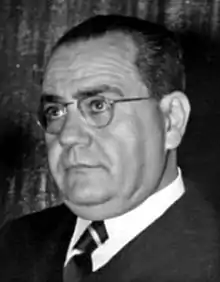 |
Juan Negrín (1892–1956) |
31 March 1939 | 17 August 1945 | 2331 | Spanish Socialist Workers' Party | Álvaro de Albornoz (1939–1945) | |
 |
José Giral (1879–1962) |
17 August 1945 | 9 February 1947 | 541 | Republican Left | Diego Martínez Barrio (1945–1962) | |
.jpg.webp) |
Rodolfo Llopis (1895–1983) |
9 February 1947 | 8 August 1947 | 180 | Spanish Socialist Workers' Party | ||
 |
Álvaro de Albornoz (1879–1954) |
8 August 1947 | 13 August 1951 | 1558 | Republican Union | ||
.svg.png.webp) |
Felix Gordón (1885–1973) |
13 August 1951 | 17 April 1960 | 3170 | Republican Union | ||
.jpg.webp) |
Emilio Herrera (1879–1967) |
17 April 1960 | 28 February 1962 | 682 | Independent | ||
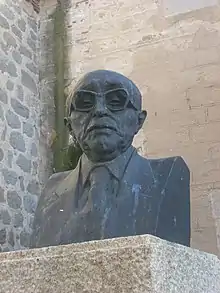 |
Claudio Sánchez-Albornoz (1893–1984) |
28 February 1962 | 28 February 1971 | 3287 | Republican Union | Luis Jiménez de Asúa (1962–1970) | |
.svg.png.webp) |
Fernando Valera (1899–1982) |
28 February 1971 | 21 June 1977 | 2305 | Republican Union | José Maldonado Gonzalez.svg.png.webp) (1970–1977) | |
See also
References
- Yossi Shain (ed). Governments-in-Exile in Contemporary World Politics. New York: Routledge. 1991. p. 152.
- Martin Ebon. World Communism Today. New York: Whittlesey House. 1948. p. 252.
.svg.png.webp)
